Law School Letter Of Recommendation
[Your Name]
[Your Address]
[City, State, Zip Code]
[Your Email Address]
[Your Phone Number]
[Today's Date]
[Recipient's Name]
[Law School Admissions Office]
[Law School Name]
[Law School Address]
[City, State, Zip Code]
Dear [Recipient's Name],
I am writing to request a letter of recommendation in support of my application to [Law School Name]. I have been inspired to pursue a legal education, and after careful consideration, I have chosen [Law School Name] due to its esteemed reputation and commitment to academic excellence.
I have had the privilege of knowing you as [state your relationship with the recommender, e.g., "my professor in Constitutional Law at XYZ University" or "my supervisor during my internship at ABC Law Firm"]. I believe that your insight into my academic and professional abilities would make your recommendation invaluable to the admissions committee.
As I aspire to join the legal profession, I am eager to demonstrate to the admissions committee my dedication to academic pursuits, strong analytical skills, and passion for justice. Throughout my academic journey, I have consistently strived to excel in my studies and actively engaged in various extracurricular activities that have honed my leadership and interpersonal abilities.
I kindly request that you include in your letter specific examples that highlight my aptitude for legal research, writing, critical thinking, and my ability to work collaboratively with others. Additionally, it would be beneficial if you could address my potential as a law student and future legal professional.
Please find attached relevant documents, including my resume, transcripts, and personal statement, to provide you with a comprehensive overview of my academic and personal background.
The deadline for submitting letters of recommendation is [mention the application deadline], and I would greatly appreciate it if you could submit your letter well before that date. If there are any online forms or specific instructions for submitting the recommendation, please let me know so that I can provide you with the necessary information.
Thank you for considering my request. Your support in this endeavor means a great deal to me, and I am genuinely grateful for the time and effort you invest in helping me achieve my academic and career goals.
If you have any questions or require any additional information, please do not hesitate to contact me at [Your Phone Number] or [Your Email Address].
Thank you once again for your kind assistance.
Sincerely,
[Your Name]
Academic Letter of Recommendation for Law School Application
[Date]
Dear Admissions Committee,
I am writing to enthusiastically recommend [Student Name] for admission to [Law School Name]. As [his/her/their] professor in [Course Name] at [University Name], I have had the privilege of observing [Student Name]'s exceptional intellectual abilities and dedication to academic excellence over the past [time period].
[Student Name] consistently demonstrated outstanding analytical skills throughout my course. [He/She/They] ranked in the top 5% of a class of [number] students and showed remarkable aptitude for legal reasoning, particularly when we covered [specific topic]. [His/Her/Their] final paper on [topic] exhibited sophisticated critical thinking and meticulous research that would serve [him/her/them] well in law school.
Beyond academic performance, [Student Name] possesses the work ethic and intellectual curiosity essential for success in legal studies. [He/She/They] regularly attended office hours to engage in substantive discussions about course material, demonstrating genuine passion for understanding complex concepts rather than merely pursuing grades.
[Student Name]'s writing skills are exemplary. [He/She/They] articulates arguments clearly and persuasively, supports positions with relevant evidence, and addresses counterarguments thoughtfully—skills that will prove invaluable in legal education and practice.
I give [Student Name] my highest recommendation without reservation. [He/She/They] has the intellectual capacity, dedication, and character to excel in your program and make meaningful contributions to the legal profession.
Please feel free to contact me at [email] or [phone] if you require additional information.
Sincerely,
[Professor Name]
[Title]
[Department]
[University Name]
[Contact Information]
Professional Letter of Recommendation for Law School (From Employer)
[Date]
Dear Admissions Committee,
I am pleased to recommend [Employee Name] for admission to [Law School Name]. As [his/her/their] supervisor at [Company Name] for the past [time period], I have witnessed firsthand the professional qualities and intellectual abilities that make [him/her/them] an outstanding candidate for legal education.
In [his/her/their] role as [position], [Employee Name] consistently demonstrated exceptional analytical thinking and problem-solving skills. When faced with [specific challenge], [he/she/they] developed a comprehensive strategy that resulted in [specific outcome]. This ability to analyze complex situations, identify key issues, and propose effective solutions mirrors the skills required for successful legal practice.
[Employee Name]'s communication skills are exemplary. [He/She/They] regularly prepared detailed reports, presented findings to senior management, and negotiated with clients and stakeholders. [His/Her/Their] ability to articulate complex ideas clearly and persuasively would serve [him/her/them] well in law school and beyond.
What distinguishes [Employee Name] is [his/her/their] exceptional work ethic and intellectual curiosity. Despite demanding professional responsibilities, [he/she/they] consistently sought opportunities for growth and demonstrated genuine interest in understanding the legal frameworks governing our industry. [His/Her/Their] questions about regulatory compliance and contractual matters revealed a natural affinity for legal reasoning.
[Employee Name] also exhibits strong ethical judgment and integrity—qualities essential for the legal profession. [He/She/They] approached every task with professionalism and maintained the highest ethical standards even when faced with difficult decisions.
I am confident that [Employee Name] will bring the same dedication, analytical rigor, and ethical commitment to legal education that [he/she/they] demonstrated in our organization. [He/She/They] has my strongest recommendation.
Please contact me at [email] or [phone] should you need further information.
Respectfully,
[Supervisor Name]
[Title]
[Company Name]
[Contact Information]
Letter of Recommendation Emphasizing Research and Writing Skills
[Date]
To the Admissions Committee,
I write to recommend [Student Name] for admission to your law school program. As [his/her/their] thesis advisor and professor at [University Name], I have supervised [his/her/their] research for [time period] and can speak confidently to [his/her/their] exceptional research and analytical writing abilities.
[Student Name]'s senior thesis on [topic] demonstrated research skills that exceed typical undergraduate work. [He/She/They] independently identified relevant sources, synthesized complex arguments from multiple disciplines, and developed an original analytical framework. The depth of research and sophistication of analysis in [his/her/their] 80-page thesis rival graduate-level work.
[His/Her/Their] writing exhibits the clarity, precision, and logical structure essential for legal writing. [Student Name] crafts arguments methodically, anticipates counterarguments, and supports claims with carefully selected evidence. When I suggested revisions, [he/she/they] responded thoughtfully and improved the work substantially, demonstrating both intellectual humility and commitment to excellence.
Beyond technical skills, [Student Name] shows remarkable intellectual independence and persistence. [He/She/They] encountered significant challenges during the research process, including [specific challenge], but approached obstacles strategically and maintained focus on [his/her/their] research objectives.
[Student Name]'s work has received recognition beyond our institution. [His/Her/Their] paper on [topic] was accepted for presentation at [conference name], and [he/she/they] received [award/honor] for outstanding undergraduate research.
I have supervised numerous undergraduate theses over my [number] years in academia, and [Student Name] ranks among the top students I have mentored. [He/She/They] possesses the research skills, analytical abilities, and dedication to excel in legal education and scholarship.
I recommend [Student Name] enthusiastically and without reservation.
Sincerely,
[Professor Name]
[Title]
[Department]
[University Name]
[Contact Information]
Character-Focused Letter of Recommendation for Law School
[Date]
Dear Members of the Admissions Committee,
I am honored to recommend [Student Name] for admission to [Law School Name]. While I can speak to [his/her/their] academic abilities as [his/her/their] professor in [Course Name], I write primarily to attest to [his/her/their] character, leadership, and commitment to service—qualities that will make [him/her/them] not only a successful law student but also an ethical and compassionate attorney.
I first met [Student Name] when [he/she/they] enrolled in my [course name] course. What immediately distinguished [him/her/them] was not just academic performance but [his/her/their] genuine concern for justice and fairness. During class discussions about [topic], [Student Name] consistently raised thoughtful questions about how legal principles affect marginalized communities and expressed sincere commitment to using education for social good.
Beyond the classroom, [Student Name] has demonstrated exceptional leadership and service. As founder of [organization/initiative], [he/she/they] organized [specific activity] that served [number] community members. This initiative required not only vision but also practical skills in coordination, communication, and problem-solving—skills essential for legal practice.
[Student Name] exhibits remarkable emotional intelligence and interpersonal skills. [He/She/They] builds genuine connections with people from diverse backgrounds and approaches disagreements with respect and openness to different perspectives. These qualities will serve [him/her/them] well in collaborative law school environments and client-centered practice.
What impresses me most is [Student Name]'s integrity and ethical judgment. When faced with [specific situation], [he/she/they] chose the principled path despite personal cost, demonstrating the moral courage required of ethical attorneys.
[Student Name] combines intellectual ability with strong character, leadership capacity, and genuine commitment to justice. [He/She/They] will contribute meaningfully to your law school community and to the legal profession.
I give [Student Name] my highest recommendation.
Warmly,
[Professor Name]
[Title]
[University Name]
[Contact Information]
Letter of Recommendation for Applicant with Non-Traditional Background
[Date]
Dear Admissions Committee,
I enthusiastically recommend [Name] for admission to your law school program. As [his/her/their] [relationship] at [organization/company] for [time period], I have observed the unique strengths and perspectives that [Name] would bring to legal education despite following a non-traditional path.
[Name] came to our organization with a background in [field], and this diverse experience has proven invaluable. [His/Her/Their] work on [specific project] required sophisticated analytical thinking, strategic planning, and stakeholder management—skills directly transferable to legal practice. The maturity and professional judgment [he/she/they] brings from [number] years of work experience distinguish [him/her/them] from typical law school applicants.
What makes [Name] an exceptional candidate is [his/her/their] demonstrated commitment to continuous learning and professional growth. Despite not following a traditional pre-law path, [he/she/they] has consistently sought opportunities to develop relevant skills. [Name] independently studied [relevant subject], volunteered with [legal organization], and pursued professional development in [area]—all while maintaining demanding work responsibilities.
[Name]'s communication skills are outstanding. [He/She/They] regularly [specific communication responsibility], demonstrating the clear, persuasive communication essential for legal practice. [His/Her/Their] ability to translate complex [field-specific] concepts for non-specialist audiences reflects the clarity of thinking that will serve [him/her/them] well in legal writing and advocacy.
The life experience and professional maturity [Name] brings will enrich law school classrooms and discussions. [He/She/They] approaches challenges with perspective, resilience, and practical problem-solving ability gained through real-world experience.
[Name] has thought carefully about the decision to pursue legal education and articulates clear reasons for this transition rooted in [his/her/their] professional experiences and long-term goals. [His/Her/Their] motivation is genuine and well-considered.
I am confident [Name] will bring exceptional value to your program and succeed in legal education. [He/She/They] has my strongest recommendation.
Respectfully,
[Name]
[Title]
[Organization]
[Contact Information]
Letter of Recommendation Highlighting Oral Advocacy Skills
[Date]
To the Admissions Committee,
I write to recommend [Student Name] for admission to [Law School Name]. As coach of our university's Mock Trial team and [his/her/their] professor, I have extensively observed [Student Name]'s exceptional oral advocacy skills and analytical abilities—qualities that predict outstanding success in legal education and practice.
[Student Name] joined our Mock Trial program in [year] and quickly distinguished [himself/herself/themselves] as one of our most talented advocates. [He/She/They] served as [role] in [number] competitions, earning [specific awards/recognition]. What sets [him/her/them] apart is not just competitive success but the sophisticated advocacy skills [he/she/they] demonstrated.
[Student Name] excels at oral argumentation. [He/She/They] presents complex legal arguments with clarity and confidence, adapts strategy in response to judges' questions, and maintains composure under pressure. During the [specific competition], [he/she/they] faced particularly challenging cross-examination but responded with poise and persuasive rebuttal, ultimately securing victory for our team.
Beyond performance skills, [Student Name] demonstrates deep analytical thinking. [He/She/They] approaches case materials methodically, identifies key legal issues, and develops comprehensive case theories. [His/Her/Their] preparation is meticulous—[he/she/they] anticipates opposing arguments, researches supporting precedents, and refines strategy based on feedback.
[Student Name] is also an exceptional team member. [He/She/They] mentored junior team members, contributed to collaborative case preparation, and maintained professionalism even in highly competitive environments. These interpersonal skills will serve [him/her/them] well in law school study groups and eventual legal practice.
The combination of analytical rigor, oral advocacy skills, and competitive success makes [Student Name] ideally suited for legal education. [He/She/They] has already demonstrated many of the skills that law schools aim to develop.
I recommend [Student Name] with great enthusiasm.
Sincerely,
[Professor/Coach Name]
[Title]
[University Name]
[Contact Information]
Brief Letter of Recommendation for Strong Academic Performer
[Date]
Dear Admissions Committee,
I am pleased to recommend [Student Name] for admission to your law school program. [He/She/They] was a student in my [Course Name] course at [University Name] during [semester/year].
[Student Name] earned an A in my course and ranked among the top students in a class of [number]. [His/Her/Their] performance on the final examination was particularly impressive, demonstrating strong analytical skills and ability to apply complex concepts to novel scenarios.
[Student Name] participated actively in class discussions and submitted thoughtful written work throughout the semester. [He/She/They] grasps difficult material quickly and communicates ideas effectively.
Based on [his/her/their] academic performance and intellectual abilities, I believe [Student Name] is well-prepared for the rigors of legal education.
I recommend [him/her/them] for admission to your program.
Sincerely,
[Professor Name]
[Title]
[Department]
[University Name]
[Contact Information]
What is a Law School Letter of Recommendation and Why is it Required
A law school letter of recommendation is a formal document written by someone who knows an applicant well—typically a professor, employer, or mentor—that evaluates the applicant's qualifications for legal education. These letters provide admissions committees with third-party perspectives on an applicant's abilities, character, and potential for success in law school and legal practice.
Law schools require these letters because they offer insights that grades and test scores cannot capture:
- Assessment of analytical and critical thinking abilities in real contexts
- Evaluation of writing and communication skills
- Evidence of work ethic, intellectual curiosity, and dedication
- Character assessment and ethical judgment
- Comparison to other students or professionals the recommender has known
- Specific examples of accomplishments and capabilities
- Prediction of success in legal education based on observed performance
Who Should Write Your Law School Recommendation Letter
The ideal recommender depends on your background and circumstances:
For recent graduates and current students:
- Professors who taught you in demanding courses, preferably upper-level seminars
- Thesis or research advisors who supervised substantial academic work
- Professors in writing-intensive courses who can evaluate analytical writing
- Faculty advisors for academic competitions (Mock Trial, Moot Court, debate)
For working professionals:
- Direct supervisors who observed your analytical and professional skills
- Senior colleagues who worked closely with you on complex projects
- Managers who can speak to your problem-solving and communication abilities
Generally strong choices:
- Anyone who knows your work well and can provide specific, detailed examples
- Recommenders who can compare you favorably to others in similar positions
- People who have observed you in intellectually demanding contexts
- Individuals who can speak to qualities relevant to legal education
Generally weak choices:
- Family members or personal friends (avoid unless truly exceptional circumstances)
- Teaching assistants or graduate students (unless they know you exceptionally well)
- Politicians or prominent figures who don't know you personally
- People who only know you casually or in limited contexts
Elements and Structure of an Effective Recommendation Letter
Opening paragraph must include:
- Clear statement of recommendation
- Nature and duration of relationship with applicant
- Context in which you know the applicant
- Your position and qualifications as a recommender
Body paragraphs should contain:
- Specific examples of the applicant's abilities and accomplishments
- Analytical or critical thinking demonstrations
- Writing and communication skills evidence
- Comparative assessments (ranking among peers)
- Work ethic and intellectual curiosity examples
- Leadership, teamwork, or interpersonal skills
- Character and ethical judgment observations
- Relevant achievements, awards, or recognition
Closing paragraph needs:
- Strong concluding recommendation statement
- Overall assessment of potential for legal education
- Offer to provide additional information
- Contact information for follow-up
Throughout the letter:
- Use specific, concrete examples rather than vague generalities
- Quantify achievements when possible (top 10%, ranked 3rd of 45, etc.)
- Avoid clichés and generic praise
- Address any potential concerns or weaknesses honestly if relevant
- Maintain professional and appropriate tone
When to Request Law School Recommendation Letters
Optimal timing:
- Request letters 4-6 weeks before earliest application deadline
- Allow minimum of 3-4 weeks for busy academic semesters
- Give more time (8-10 weeks) during peak periods (November-December)
Best times to request if you're a student:
- End of semester while your work is fresh in professor's mind
- After receiving final grades when performance is confirmed
- During office hours or by appointment, not rushed after class
Best times to request if you're working:
- During performance review periods when your work is being evaluated
- After completing major projects successfully
- When you're in good standing and relationship is strong
Circumstances requiring earlier requests:
- Recommender is going on sabbatical or extended leave
- You're applying for early decision programs
- Recommender is known to be very busy or slow to complete letters
- You're applying to many schools (more work for recommender)
When to update or request new letters:
- Taking gap years and letters are more than 2-3 years old
- Your accomplishments and skills have significantly evolved
- Previous recommenders are no longer available
- Reapplying and want to address previous application weaknesses
How to Request and Manage the Recommendation Process
Initial approach:
- Schedule meeting or send thoughtful email requesting recommendation
- Ask if they can write a strong letter (gives them opportunity to decline politely)
- Explain your law school goals and timeline
- Give them opportunity to decline if they're too busy
Materials to provide recommenders:
- Updated resume or CV highlighting relevant accomplishments
- Transcript showing your academic performance
- Personal statement or statement of purpose draft
- List of schools you're applying to with deadlines
- Brief summary of your goals and why law school
- Specific accomplishments or papers from their class (if academic recommender)
- LSAC letter of recommendation forms and instructions
- Addressed and stamped envelopes if sending by mail (rare now)
Communication throughout:
- Send polite reminder 2 weeks before deadline if letter not yet submitted
- Provide updates if deadlines change
- Thank them promptly after each letter is submitted
- Keep them informed of admission results
After admission:
- Send thank-you note expressing appreciation for their support
- Update them on your decision and future plans
- Maintain relationship as part of professional network
How Many Recommendation Letters Do You Need for Law School
Standard requirements:
- Most law schools require 2 letters of recommendation
- Some schools require 2 but allow up to 3-4 letters
- Few schools require only 1 letter (rare)
- Some programs specify types (academic, professional, etc.)
Strategic considerations for number:
- Submit exactly the required number unless you have compelling additional perspective
- Third letter should add significantly different perspective or information
- More letters aren't better if they're redundant or weaker
- Follow school-specific instructions precisely
Distribution recommendations:
- Recent graduates: 2 academic letters ideal, or 1 academic + 1 professional
- Working professionals (3+ years out): 1-2 professional + 1 academic acceptable
- Career changers: Mix professional and academic to show breadth
- Multiple letters from same context (all professors) can be redundant
LSAC Letter of Recommendation Service:
- Most applicants use LSAC's centralized system
- Letters submitted once and distributed to all schools
- Can designate which letters go to which schools
- System allows up to 5 letters in your file
- Can submit letters before deciding where to apply
Requirements and Prerequisites Before Requesting Letters
Relationship requirements:
- Recommender must know you well enough for detailed assessment
- Minimum of one semester or 6 months working relationship
- Ideally observed your work in intellectually demanding context
- Should have directly evaluated your performance
Prerequisites on your end:
- Completed LSAC registration and set up Credential Assembly Service
- Prepared application materials (resume, personal statement draft)
- Researched schools and determined deadlines
- Identified appropriate recommenders based on your background
What recommenders need:
- Clear deadline information with buffer time
- School-specific requirements if any
- Your LSAC account information for submission
- Background materials about you and your goals
Before approaching recommender:
- Confirm they view you favorably (based on grades, feedback, interactions)
- Ensure they have time and willingness to write thoughtful letter
- Verify they're appropriate recommender for your situation
- Check if they have any concerns about writing a strong letter
Formatting, Length, and Style Guidelines for Recommendation Letters
Length specifications:
- Ideal length: 1-2 pages (400-800 words)
- Minimum: 1 full page to provide adequate detail
- Maximum: 2 pages to maintain reader engagement
- Brief letters (half page) appear perfunctory and weak
Formatting standards:
- Professional business letter format
- Standard margins (1 inch) and readable font (11-12 point)
- Include date, formal salutation, and proper closing
- Recommender's letterhead when available
- Digital signature acceptable for electronic submission
Tone and style:
- Professional and formal rather than casual
- Specific and evidence-based rather than vague
- Enthusiastic but credible (avoid hyperbole)
- Honest and balanced while highlighting strengths
- Third-person perspective on the applicant
Submission method:
- Most common: Electronic submission through LSAC
- Some schools: Direct email to admissions office
- Rare: Physical letter by mail (check school requirements)
- Confidential: Letters are typically not shared with applicants
Language considerations:
- Use active voice and strong action verbs
- Avoid qualified praise ("fairly good," "relatively strong")
- Include superlatives when genuinely warranted
- Compare favorably to other students/employees when possible
- Address the applicant professionally (surname preferred)
Common Mistakes to Avoid in Law School Recommendation Letters
Mistakes by recommenders:
- Writing generic letters that could apply to anyone
- Using vague praise without specific examples
- Focusing only on personality without evaluating intellectual abilities
- Being overly brief or appearing rushed
- Including damning with faint praise ("adequate," "satisfactory")
- Missing deadlines or submitting late
- Discussing inappropriate topics or protected characteristics irrelevantly
- Overusing superlatives without substantiation
- Comparing unfavorably to other students even if subtle
Mistakes by applicants:
- Waiting too long to request letters (less than 3 weeks before deadline)
- Choosing recommenders who don't know you well
- Selecting recommenders based on prestige rather than relationship
- Failing to provide adequate background materials
- Not following up appropriately
- Choosing all recommenders from same context (redundancy)
- Requesting letters from family, friends, or inappropriate sources
- Not waiving right to access letters (raises credibility concerns)
- Forgetting to thank recommenders
- Assuming letters are submitted without verification
Content mistakes in letters:
- Including information about race, religion, age, or other protected characteristics unless directly relevant
- Discussing personal problems or challenges inappropriately
- Focusing excessively on weaknesses
- Plagiarizing or copying from other letters
- Including inaccurate information
- Being dishonest or exaggerating accomplishments
Tips, Best Practices, and Strategies for Strong Recommendations
For applicants:
- Build relationships with potential recommenders early (not just before applying)
- Excel in challenging courses to give professors strong material for letters
- Engage meaningfully in class discussions and office hours
- Complete substantial projects that demonstrate relevant skills
- Choose recommenders who can address different aspects of your abilities
- Prepare comprehensive packet of materials for recommenders
- Make submission process as easy as possible
- Give generous timeline without appearing to rush
For recommenders:
- Review your notes, the student's work, and grade records before writing
- Include opening that establishes your credibility and relationship
- Use specific anecdotes and examples throughout
- Quantify achievements and provide comparative context
- Address skills most relevant to legal education
- Be honest but strategic in addressing weaknesses if necessary
- Proofread carefully for errors
- Submit well before deadline
Strategic approaches:
- If you have weakness in GPA, seek letter addressing strong work ethic and intellectual growth
- If you're older applicant, get letters emphasizing maturity and commitment
- If you're career changer, secure letters that connect past experience to legal education
- For applicants with gaps or unusual backgrounds, address this context appropriately
Follow-up best practices:
- Send thank-you note immediately after letter is submitted
- Update recommenders on admission outcomes
- Stay in touch professionally over time
- Offer to write recommendations for others in future
- Express appreciation meaningfully and specifically
After Sending: Follow-Up and Next Steps
Immediate verification:
- Check LSAC system to confirm letter was received and processed
- Verify letter appears in your credential assembly service report
- Confirm letter was assigned to correct schools if using selective distribution
If letter hasn't been submitted:
- Send polite reminder one week before deadline
- Offer to provide any additional information needed
- If close to deadline with no response, consider backup recommender
After successful submission:
- Send thank-you email within 24-48 hours
- Express specific appreciation for their time and support
- Brief update about application process timeline
During admission cycle:
- Update recommenders when you receive admission decisions
- Share good news and thank them again for their role
- If waitlisted or denied, no need to inform recommenders unless relationship warrants
After enrollment decision:
- Send formal thank-you note or email with your final decision
- Explain why you chose particular school
- Express how their letter contributed to your success
- Maintain connection as part of professional network
Long-term relationship:
- Update them occasionally on law school progress
- Consider them for future references or recommendations
- Offer assistance if you can help them in future
- Remember them during significant career milestones
Comparing Law School Recommendations to Other Professional References
Law school vs. job recommendations:
- Law school letters emphasize intellectual and analytical abilities more than technical skills
- Job references focus on workplace competencies and professional accomplishments
- Law school letters need specific academic or analytical examples
- Job references prioritize results and measurable outcomes
- Law school letters should address potential for rigorous academic work
Law school vs. graduate school recommendations:
- Both emphasize intellectual abilities but law school less focused on research potential
- Graduate school letters often highlight specialized knowledge in specific field
- Law school letters emphasize writing, analytical reasoning, and oral argumentation more
- Graduate school recommendations focus more on ability to conduct independent research
- Law school seeks broader critical thinking rather than subject matter expertise
Letters vs. other application components:
- Letters provide external validation of claims in personal statement
- Recommendations offer comparative context that grades alone don't provide
- Letters can address weaknesses or unusual circumstances in application
- Strong letters can distinguish between similarly qualified candidates
- Recommendations complement rather than substitute for other materials
Alternatives and supplements:
- Additional essays or writing samples show abilities directly
- Interviews provide personal evaluation by admissions committee
- Addenda can address specific concerns or circumstances
- Portfolio of work provides concrete evidence of capabilities
- Professional certifications demonstrate commitment and expertise
Advantages and Disadvantages of Law School Recommendation Letters
Advantages:
- Provide third-party validation of applicant's abilities and character
- Offer specific examples and context that applications lack
- Allow discussion of qualities not reflected in grades or test scores
- Give comparative perspective on applicant relative to peers
- Address potential concerns or weaknesses constructively
- Demonstrate professional relationships and networking ability
- Show how others perceive applicant's potential
- Add credibility through recommender's expertise and position
Disadvantages:
- Quality depends entirely on recommender's effort and writing ability
- Applicants have limited control over content after waiving access rights
- Generic or weak letters can harm application
- Time-consuming process for both parties
- Some applicants lack access to strong recommenders
- Letters may be less important than grades and LSAT scores
- Risk of missed deadlines affecting entire application
- Difficult to secure strong letters years after graduation
- Non-traditional applicants may struggle to find appropriate academic recommenders
Balancing considerations:
- Strong letters significantly benefit borderline applications
- Weak letters can raise concerns even for strong candidates
- Most important for applicants with unusual backgrounds or weaknesses to explain
- Less critical for applicants with exceptional numbers (GPA and LSAT)
- Can be differentiator among similarly qualified applicants
- Value varies by school's holistic vs. numbers-focused approach

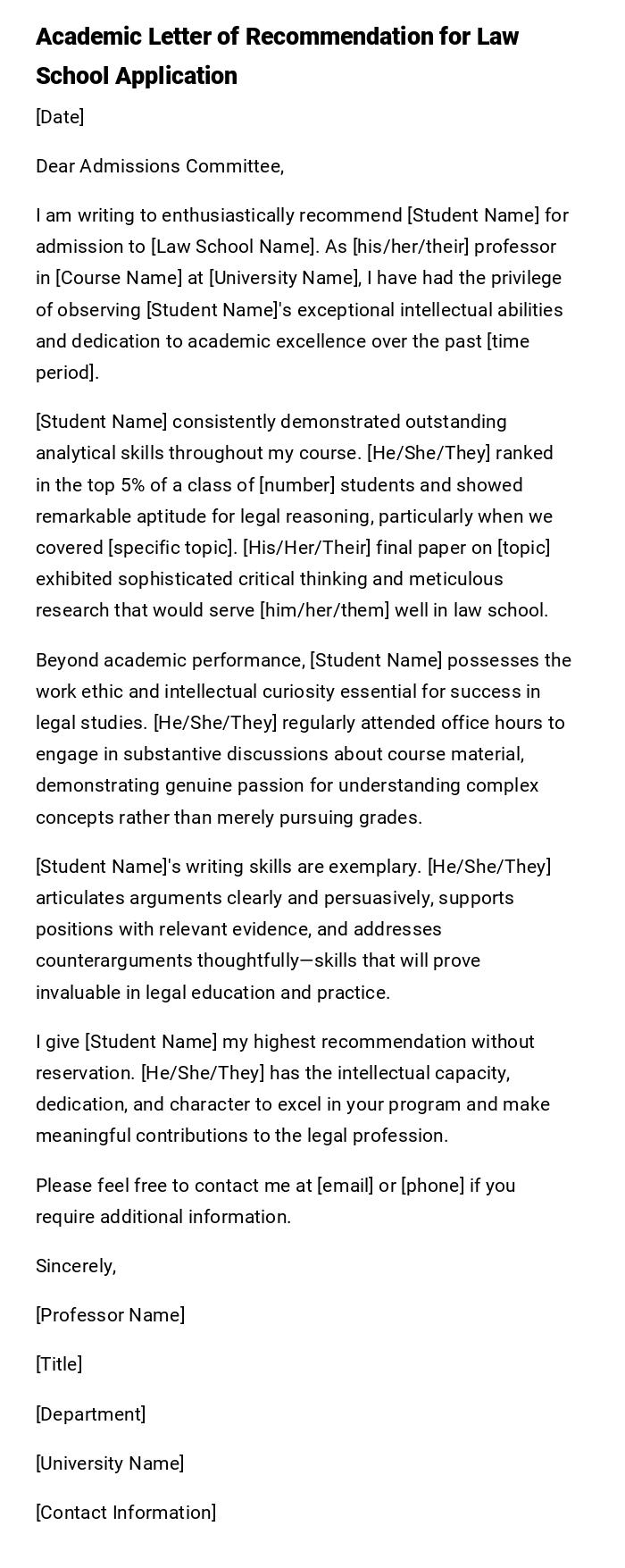
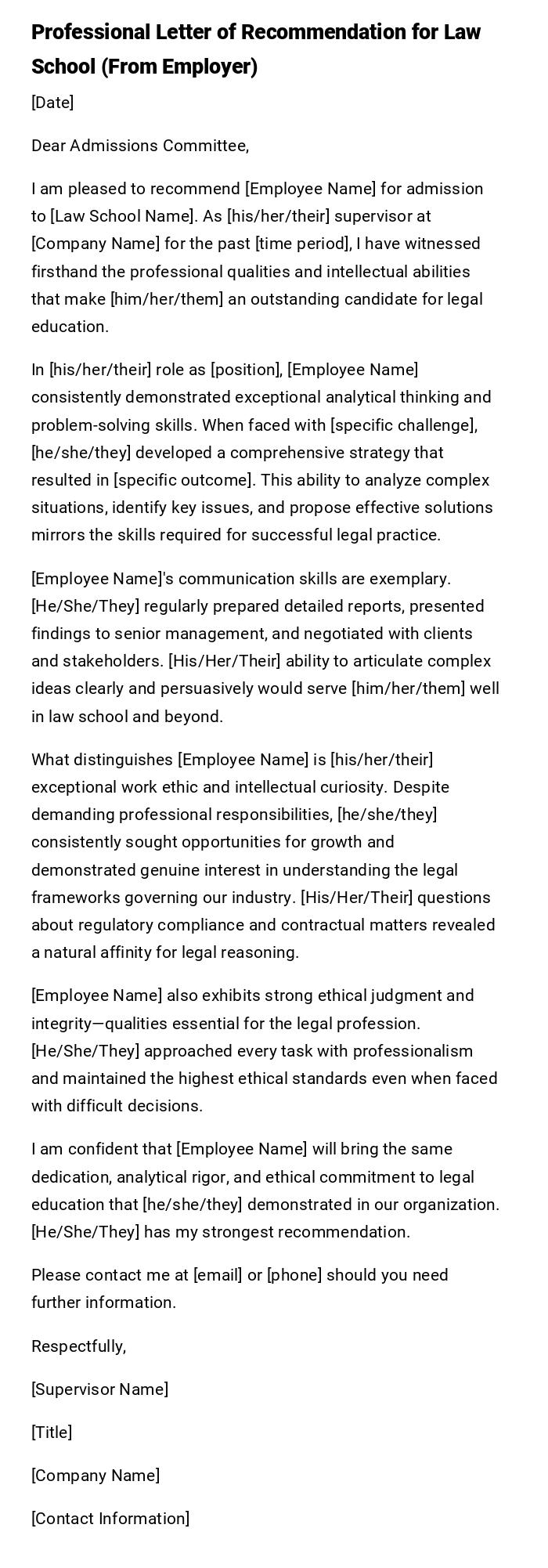
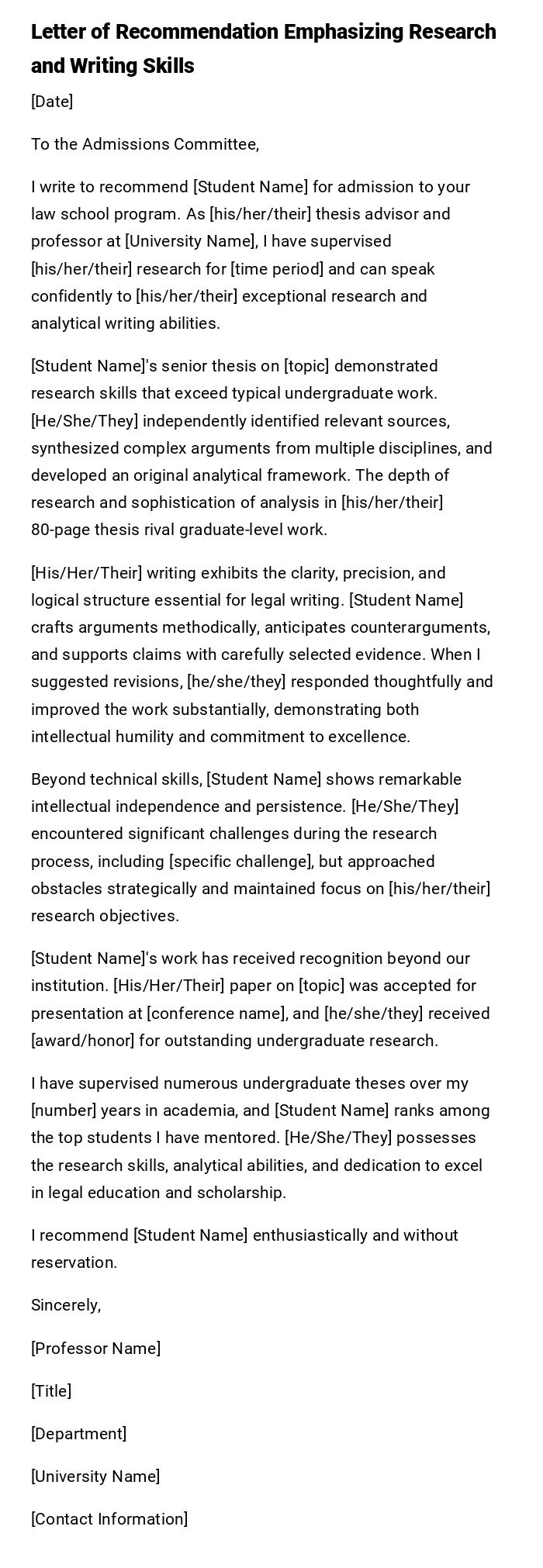
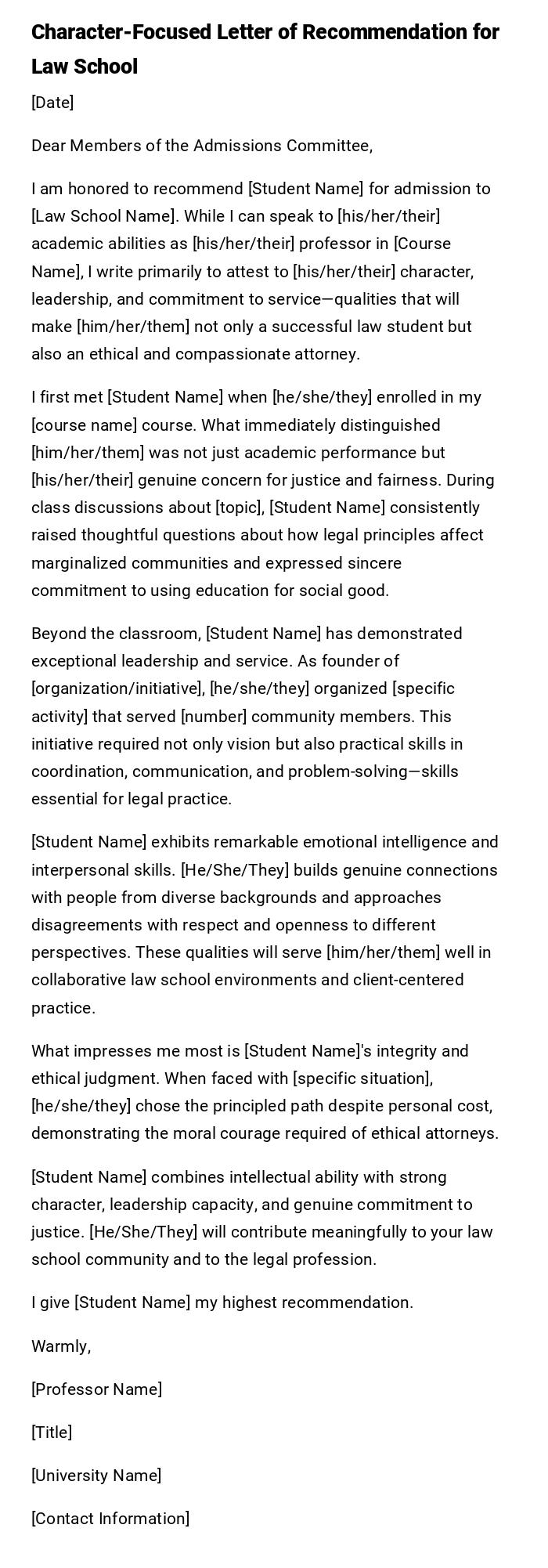

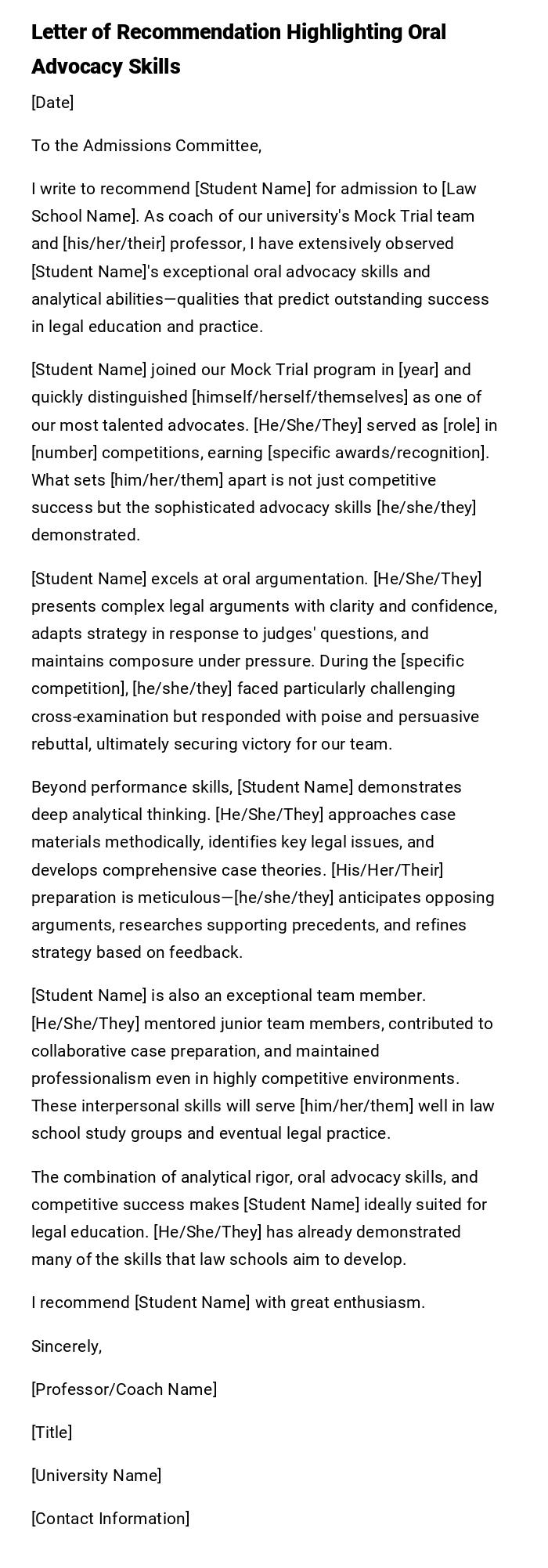
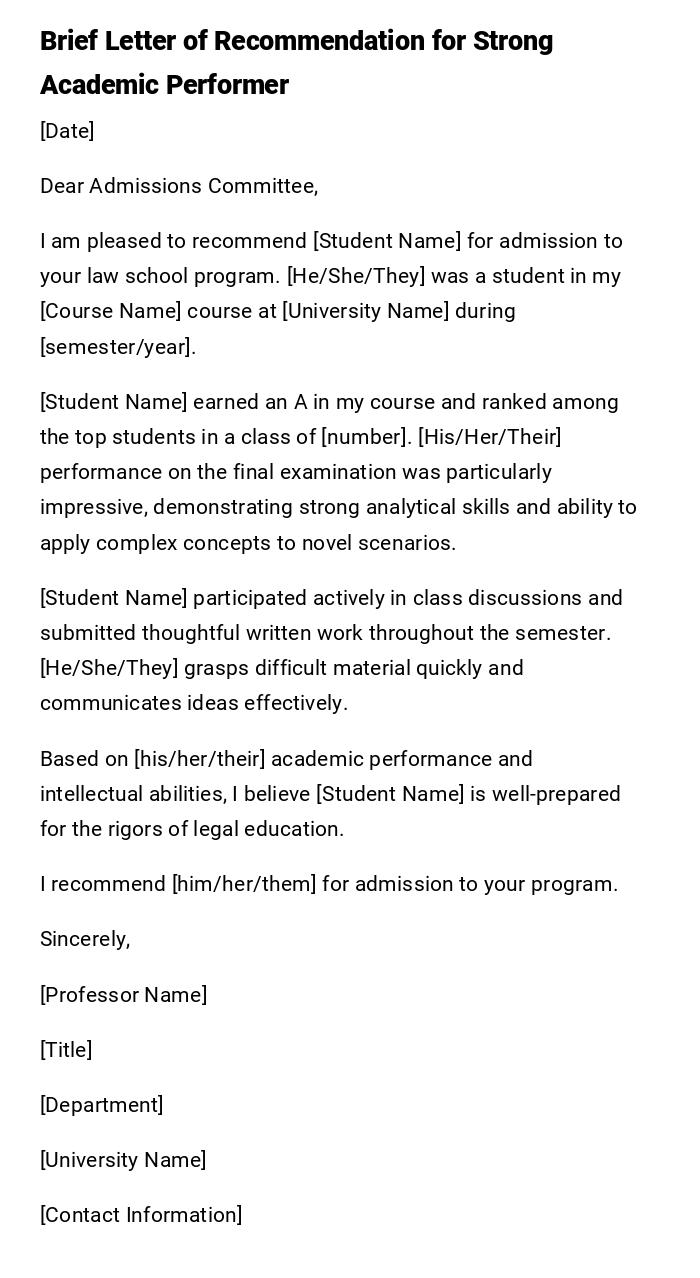

 Download Word Doc
Download Word Doc
 Download PDF
Download PDF